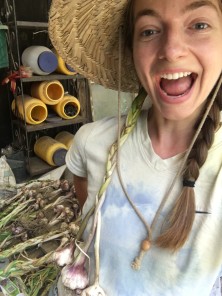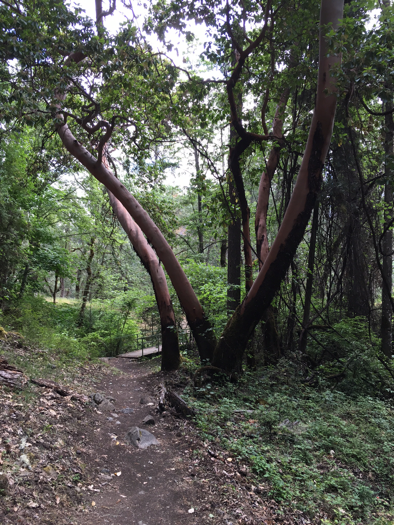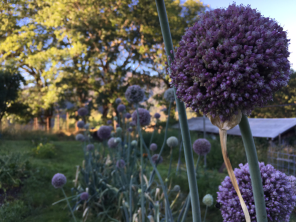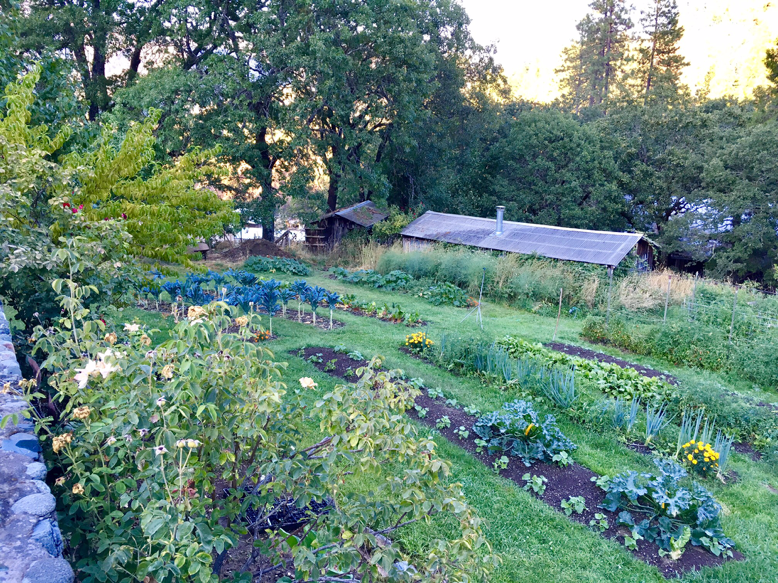Guest Post by Hollyn Hartlep – Bar 717 Ranch Gardener – Summer 2016
 As I reflect on my time spent in the gardens at Bar 717 Ranch, many fond memories come to mind, and I’d like to share just a few that brought a smile to my face.
As I reflect on my time spent in the gardens at Bar 717 Ranch, many fond memories come to mind, and I’d like to share just a few that brought a smile to my face.
First, I must disclose that this summer was my first at Bar 717 Ranch, and I am exceedingly grateful to have been welcomed with open arms and to have felt included as part of the community upon arriving. The history of the ranch is a rare treasure, and each day I learned a little more about its history, from campers and fellow staff members, some of whose families have ties to camp many generations back.
When I found a place on the planet not reachable by cell phone service, I immediately sent in an application. So badly I wanted to live on the ranch, that when talking on the phone with Camp Director Kent Collard before I had the position, I impulsively replied “That wouldn’t be a problem at all,” after he told me that a gardener in the past had slept at the lower garden to keep bears away and that my job might entail such measures. Living in Florida, I had naturally never encountered a bear, nor did I know whether it would be dangerous or not to sleep in their territory and fend them off—but I didn’t care, all I knew was that I wanted to spend the summer at Bar 717 Ranch, and I ended up doing so!
 On the beautiful walks down the mountain to Homestead Garden, I thought to myself, “How many people get to walk a path in a National Forest to get to work?” A lucky few. This summer I tasted the most flavorful tomatoes I have in my life, and that in turn, was thanks to the richest soil I have also ever seen. The cows and horses, munching on ranch grasses, produced nutrient rich manure, which, when mixed with compost collected from our daily meals, and grass clippings from the ranch lawns, made a garden compost teeming with worms, microbiota, and important minerals needed to grow healthy plants. This integration of livestock and crops makes for the most sustainable method of farming, as fertilizer does not have to be transported, but is simply recycled from the land from which it came.
On the beautiful walks down the mountain to Homestead Garden, I thought to myself, “How many people get to walk a path in a National Forest to get to work?” A lucky few. This summer I tasted the most flavorful tomatoes I have in my life, and that in turn, was thanks to the richest soil I have also ever seen. The cows and horses, munching on ranch grasses, produced nutrient rich manure, which, when mixed with compost collected from our daily meals, and grass clippings from the ranch lawns, made a garden compost teeming with worms, microbiota, and important minerals needed to grow healthy plants. This integration of livestock and crops makes for the most sustainable method of farming, as fertilizer does not have to be transported, but is simply recycled from the land from which it came.
 No matter how many times in my life I’ve waited patiently for a baby plant to push its cotyledons out of the soil, seeing each little sprout emerge always brings excitement and joy to my day. I am so happy that it did for others too this summer. Campers came in to check up on the corn in the Iroquois Circle, a Three Sister’s inspired bed new to the ranch this season. They helped build a pebble pathway through the rose—and now melon and ground cherry—garden, and to weed, seed, and transplant. They came for edible plant tours, where they could try some of the plants they didn’t know were edible—the most popular among them, the spicy purple leek seeds. It gave me a deep sense of satisfaction to see camp-goers enthused about the purslane that made its way from the lower garden to the salad bar at lunch. What could be more sustainable than eating a weed that would have been pulled from the ground anyhow? The best part is purslane was likely the most nutritious food on the salad bar, boasting the highest omega 3 content of all land plants.
No matter how many times in my life I’ve waited patiently for a baby plant to push its cotyledons out of the soil, seeing each little sprout emerge always brings excitement and joy to my day. I am so happy that it did for others too this summer. Campers came in to check up on the corn in the Iroquois Circle, a Three Sister’s inspired bed new to the ranch this season. They helped build a pebble pathway through the rose—and now melon and ground cherry—garden, and to weed, seed, and transplant. They came for edible plant tours, where they could try some of the plants they didn’t know were edible—the most popular among them, the spicy purple leek seeds. It gave me a deep sense of satisfaction to see camp-goers enthused about the purslane that made its way from the lower garden to the salad bar at lunch. What could be more sustainable than eating a weed that would have been pulled from the ground anyhow? The best part is purslane was likely the most nutritious food on the salad bar, boasting the highest omega 3 content of all land plants.
 It would have been a daunting task to take care of the gardens alone, and I am incredibly grateful to the people who helped me. The third session CILTS had an overnight at the lower garden, and spent most of the hours of sunlight the following day completely ridding the corn, squash, beans, tomatoes and pepper rows of weeds. I was happy to hear that many of them, while initially reluctant to spend most of their day pulling weeds, found it to be quite calming and meditative—some even found the time to come by the upper garden to help out more! It was a delight to have Reilly, the garden counselor, devote his time to the garden and provoke interest in it, from children and adults alike, with his interactive and hilarious skits. Reilly, the talented Mugalian siblings, and a ukulele-playing camper brought an audience in for a small garden concert during first session. Quite a few staff members stopped by to help with different chores around the gardens, and the very friendly and helpful ranch crew members were always a radio call away, happy to help with any problems I ran into. A successful garden takes effort from many players, from the insects aerating the soil to the kitchen crew making use of the harvest. Over the summer I learned that gardening is always a team effort.
It would have been a daunting task to take care of the gardens alone, and I am incredibly grateful to the people who helped me. The third session CILTS had an overnight at the lower garden, and spent most of the hours of sunlight the following day completely ridding the corn, squash, beans, tomatoes and pepper rows of weeds. I was happy to hear that many of them, while initially reluctant to spend most of their day pulling weeds, found it to be quite calming and meditative—some even found the time to come by the upper garden to help out more! It was a delight to have Reilly, the garden counselor, devote his time to the garden and provoke interest in it, from children and adults alike, with his interactive and hilarious skits. Reilly, the talented Mugalian siblings, and a ukulele-playing camper brought an audience in for a small garden concert during first session. Quite a few staff members stopped by to help with different chores around the gardens, and the very friendly and helpful ranch crew members were always a radio call away, happy to help with any problems I ran into. A successful garden takes effort from many players, from the insects aerating the soil to the kitchen crew making use of the harvest. Over the summer I learned that gardening is always a team effort.
The time spent away from the modern day demands of a fast-paced world gave me the chance to dig my hands down into the soil everyday, share a living space with interesting people from around the world who I can now call my friends, listen to the sounds of the birds and crickets, and—quite literally—smell the roses.
Bar 717 Ranch and the gardens within it hold a warm place in my heart, and I am forever grateful to have had the opportunity to spend my summer as part of such a lovely community. I hope that camp-goers enjoy the gardens as much as I did, and that the gardens continue to play an important role at the ranch.


Her mama must be so proud!